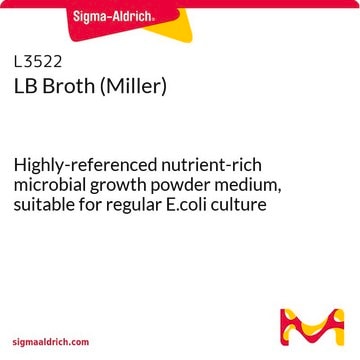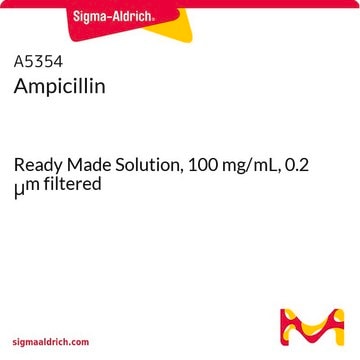L5542
LB Agar Plates
pre-poured LB agar plates for E. coli
Synonym(s):
pre-poured LB agar plates
Sign Into View Organizational & Contract Pricing
All Photos(1)
About This Item
UNSPSC Code:
41121800
NACRES:
NA.74
Recommended Products
grade
for molecular biology
sterility
sterile; autoclaved
form
plates (10 cm)
plates (10cm, 20-25ml each)
capacity
20-25 mL
storage temp.
2-8°C
suitability
nonselective for Escherichia coli
nonselective for coliforms
Related Categories
General description
Lennox LB is a highly-referenced microbial growth medium used for the cultivation of Escherichia coli. This nutrient-rich microbial broth contains peptides, amino acids, water-soluble vitamins and carbohydrates in a low-salt formulation. The addition of agar provides a solid medium for microbial growth.
Application
Suitable for non-selective cultivation of E. coli strains for cloning, DNA plasmid production and production of recombinant proteins.
LB Agar Plates has been used:
LB Agar Plates has been used:
- to culture bacteria like, Escherichia coli strain INV- α and methicillin-susceptible Staphylococcus aureus
- to culture numerous bacteria and is used in strain storage method
- to analyse the egestion of midgut microbes during sand fly bites
Features and Benefits
Lennox LB Agar plates provide:
- Convenient, ready-to-use 10cm format
- Standard formulation
Components
15g/L Agar
10g/L Tryptone
5 g/L Yeast Extract
5 g/L NaCl
10g/L Tryptone
5 g/L Yeast Extract
5 g/L NaCl
related product
Product No.
Description
Pricing
Storage Class Code
13 - Non Combustible Solids
WGK
WGK 2
Flash Point(F)
Not applicable
Flash Point(C)
Not applicable
Personal Protective Equipment
dust mask type N95 (US), Eyeshields, Gloves
Certificates of Analysis (COA)
Search for Certificates of Analysis (COA) by entering the products Lot/Batch Number. Lot and Batch Numbers can be found on a product’s label following the words ‘Lot’ or ‘Batch’.
Already Own This Product?
Find documentation for the products that you have recently purchased in the Document Library.
Bacteria Detection and Differentiation Using Impedance Flow Cytometry
Clausen C, et al.
Sensors, 18(10), 3496-3496 (2018)
Synthesis of fluorescent D-amino acids and their use for probing peptidoglycan synthesis and bacterial growth in situ
Kuru E, et al.
Nature Protocols, 10(1), 33-33 (2015)
Casper Hyttel Clausen et al.
Sensors (Basel, Switzerland), 18(10) (2018-10-20)
Monitoring of bacteria concentrations is of great importance in drinking water management. Continuous real-time monitoring enables better microbiological control of the water and helps prevent contaminated water from reaching the households. We have developed a microfluidic sensor with the potential
Gut microbes egested during bites of infected sand flies augment severity of leishmaniasis via inflammasome-derived IL-1beta
Dey R, et al.
Cell host & microbe, 23(1), 134-143 (2018)
Alex Golberg et al.
AAPS PharmSciTech, 10(3), 881-886 (2009-07-03)
The purpose of this study was to examine the feasibility of using irreversible electroporation (IRE) as a non-chemical method for eliminating microorganisms of liquid drugs. The studied drug was a topical ophthalmic medication, a pharmaceutical field in which the problem
Our team of scientists has experience in all areas of research including Life Science, Material Science, Chemical Synthesis, Chromatography, Analytical and many others.
Contact Technical Service







